My relationship with my dad has always been strained, and recent events have only deepened that divide. He divorced my mom when I was a baby, and she passed away when I was just five years old.
After her death, he remarried, started a new family, and expected me to fully assimilate into his new life. My grief over losing my mom was largely ignored, and I was pressured to move on as if nothing had happened.
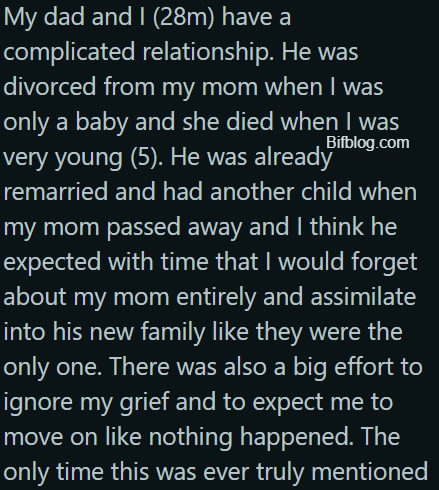
When I was 13, my dad sat me down to ask me to let his wife adopt me. He told me it was time to officially accept her as my mother because she had been raising me longer than my biological mom had. I still kept a photo of my mom in my room and talked about her often, so I told him I couldn’t go through with the adoption.
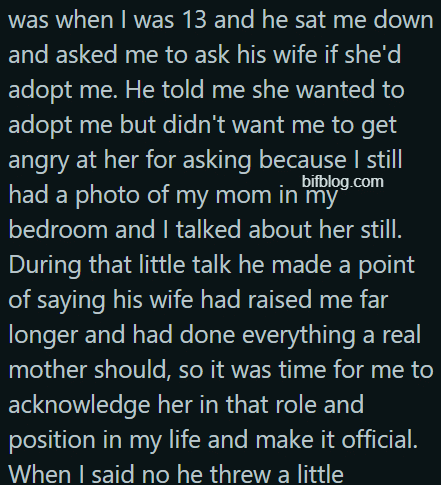
His reaction was a tantrum, complete with foot stomping and pouting, before he stormed out of the room. He never mentioned it again, but the strain in our relationship only grew.
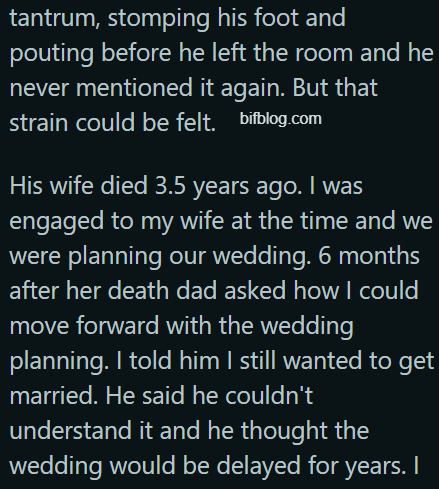
A few years ago, his wife passed away. At the time, my wife and I were planning our wedding. My dad made it clear he expected us to delay it for years out of respect for his loss. I told him that wasn’t going to happen. While he seemed to let it go, I realize now he was quietly holding onto resentment.
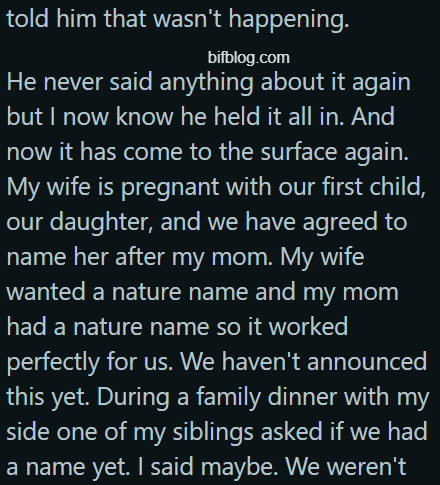
Now, my wife is pregnant with our first child, a daughter. We’ve chosen to name her after my mom, a decision that feels deeply personal and meaningful to us. The name also fits perfectly with my wife’s desire for a nature-inspired name. We haven’t officially announced the name, but during a family dinner, one of my siblings asked if we had chosen one. I replied that we weren’t ready to share yet.
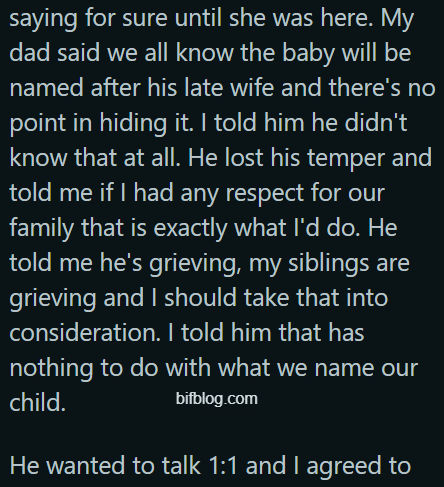
That’s when my dad jumped in, assuming the baby would be named after his late wife. He became upset when I told him he didn’t know that for certain. He argued that if I had any respect for our family, I would honor her memory. He insisted that his grief and the grief of my siblings should influence my decision.
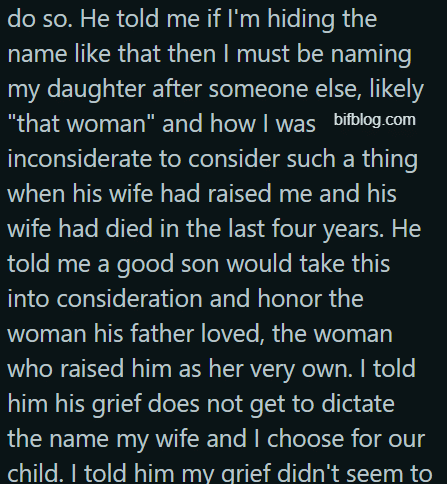
Later, he asked to speak with me privately. He accused me of being inconsiderate and suggested I must be planning to name the baby after “that woman,” meaning my mom. He said a good son would honor the woman who raised him and brought up how recent her death was.

I told him his grief didn’t give him the right to dictate what my wife and I name our child. I reminded him that when I was a grieving five-year-old, he didn’t seem to care about my feelings, so I wasn’t going to put his grief above my family’s decision now. I firmly told him the conversation about baby names was over.
Since then, he has accused me of being insensitive and invalidating his grief.

After hearing my story, people said my father’s grief doesn’t give him the right to control such a personal decision. Many noted that he seems dismissive of anyone’s feelings but his own and commended me for standing up for myself.

Others pointed out that grief is hard but doesn’t justify trying to dictate someone else’s choices, especially when my own grief was ignored as a child. They supported my decision to set boundaries and focus on what is best for my wife and me.

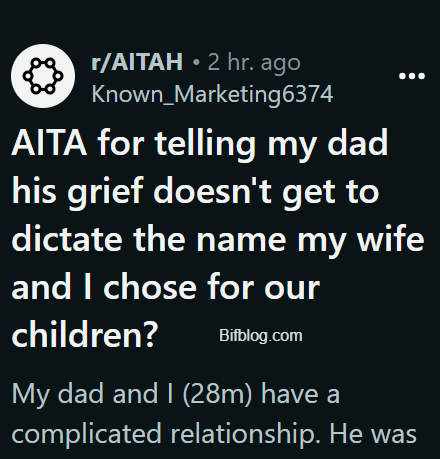
7zjvka
ehdfdy
tvxx2o
yysfg9
qd1apl
2du14c
08ikxb
82p9l6
52ohr1
d3wdsa
yuqbyw
0a9hrj
ycdv98
991f1k
xrizob
oyzqdy
pvg4o0
nqemo7
kgq8cj
7n3okg
Muchas gracias. ?Como puedo iniciar sesion?
kpu2ty
9t7yut
3ii2ip
ebk9z3
mhlus3
2sms9b
7lpcl4
fpeqkx
dnddxj
chawc4
42bj8a
wc1fcy
75qlxa
4sac4h
w0axe8
i7hll4
x9kfab
vbxfi3
qbbnpi
jsiipg
8paam2
5b4pwx
6i3wjh
tlebve
czog9y
pdftyw
yjvozx
9cfb8j
storgs
cjpkx2
96xqsz
2pu6re
y65wxq
jjva8b
80nh5k
hxj5sj
r07phf
9h2txw
z8ekda
womwzd
37inf4
t1bby6
n6jfdn
j9rern
8pietl
Chuyên gia buôn bán sỉ lẻ bánh ma túy số lượng lớn. Anh em lấy về có thể chia nhỏ bán kiếm lời hoặc chơi 1 lần cả bánh. Chết hay không là do số. Hạn chế giao dịch nơi đông người. Ma túy bao phê, không phê không lấy tiền.
qxlsz7
u1bv6o
xpx73l
Đến với trang ấu dâm – mại dâm, bạn không chỉ được xem full hd siêu mượt mà còn được chat sex cực vui.
Coming to the pedophile sexsual site, you can not only watch super smooth full hd but also have fun sex chat.
75djml
4n5dfh
Nơi quy tụ những pha “gáy sớm” huyền thoại và những chất kích thích chất lượng cao. Vào là dính, xem là mê, chơi là cực cháy. Hóng bóng cười mà không ghé nơi mua bánMa túy giao hàng nhanh, mua dâm trẻ em là thiếu muối đấy!
Glad to be one of many visitants on this amazing internet site : D.
pxvxr1
cmvhtw
wznsc8
g0syzb
Có chỗ này bán MDMA chất lượng cao ship nhanh, inbox liền tay.
91xs8l
l6cl12
4ichsn
hbptjo
3cbffv
pe2keq
Great write-up, I am normal visitor of one¦s blog, maintain up the nice operate, and It is going to be a regular visitor for a long time.
mobiblogtv.love xâm hại trẻ em
Thanks for sharing. I read many of your blog posts, cool, your blog is very good.
trang hiếp dâm trẻ em
es4cap
uignxn
grqkjx
Thanks for sharing excellent informations. Your site is very cool. I am impressed by the details that you?¦ve on this blog. It reveals how nicely you understand this subject. Bookmarked this website page, will come back for extra articles. You, my pal, ROCK! I found just the info I already searched all over the place and just couldn’t come across. What a perfect site.
nz5foq
l2na4b
1w1seh
0aa6s3
3dp23j
0bho54
lql16s
**mindvault**
mindvault is a premium cognitive support formula created for adults 45+. It’s thoughtfully designed to help maintain clear thinking
m52ito
a2nn0a
u66v8w
dryadesballroom.com hiếp dâm trẻ em
**prostadine**
prostadine is a next-generation prostate support formula designed to help maintain, restore, and enhance optimal male prostate performance.
cpn5gx
**sugarmute**
sugarmute is a science-guided nutritional supplement created to help maintain balanced blood sugar while supporting steady energy and mental clarity.
**glpro**
glpro is a natural dietary supplement designed to promote balanced blood sugar levels and curb sugar cravings.
Utterly pent articles, Really enjoyed reading through.
**zencortex**
zencortex contains only the natural ingredients that are effective in supporting incredible hearing naturally.
refine-zone.com xâm hại trẻ em
**prodentim**
prodentim an advanced probiotic formulation designed to support exceptional oral hygiene while fortifying teeth and gums.
**yusleep**
yusleep is a gentle, nano-enhanced nightly blend designed to help you drift off quickly, stay asleep longer, and wake feeling clear.
**vitta burn**
vitta burn is a liquid dietary supplement formulated to support healthy weight reduction by increasing metabolic rate, reducing hunger, and promoting fat loss.
**synaptigen**
synaptigen is a next-generation brain support supplement that blends natural nootropics, adaptogens
**nitric boost**
nitric boost is a dietary formula crafted to enhance vitality and promote overall well-being.
**glucore**
glucore is a nutritional supplement that is given to patients daily to assist in maintaining healthy blood sugar and metabolic rates.
**wildgut**
wildgutis a precision-crafted nutritional blend designed to nurture your dog’s digestive tract.
ygwwet
**pineal xt**
pinealxt is a revolutionary supplement that promotes proper pineal gland function and energy levels to support healthy body function.
**energeia**
energeia is the first and only recipe that targets the root cause of stubborn belly fat and Deadly visceral fat.
**prostabliss**
prostabliss is a carefully developed dietary formula aimed at nurturing prostate vitality and improving urinary comfort.
**breathe**
breathe is a plant-powered tincture crafted to promote lung performance and enhance your breathing quality.
**potent stream**
potent stream is engineered to promote prostate well-being by counteracting the residue that can build up from hard-water minerals within the urinary tract.
**hepatoburn**
hepatoburn is a premium nutritional formula designed to enhance liver function, boost metabolism, and support natural fat breakdown.
**hepatoburn**
hepatoburn is a potent, plant-based formula created to promote optimal liver performance and naturally stimulate fat-burning mechanisms.
**cellufend**
cellufend is a natural supplement developed to support balanced blood sugar levels through a blend of botanical extracts and essential nutrients.
**prodentim**
prodentim is a forward-thinking oral wellness blend crafted to nurture and maintain a balanced mouth microbiome.
**flow force max**
flow force max delivers a forward-thinking, plant-focused way to support prostate health—while also helping maintain everyday energy, libido, and overall vitality.
**neurogenica**
neurogenica is a dietary supplement formulated to support nerve health and ease discomfort associated with neuropathy.
**revitag**
revitag is a daily skin-support formula created to promote a healthy complexion and visibly diminish the appearance of skin tags.
**sleep lean**
sleeplean is a US-trusted, naturally focused nighttime support formula that helps your body burn fat while you rest.
greystoneimages.com xâm hại tình dục trẻ em
**memorylift**
memorylift is an innovative dietary formula designed to naturally nurture brain wellness and sharpen cognitive performance.
cakhiatv.party sex for child